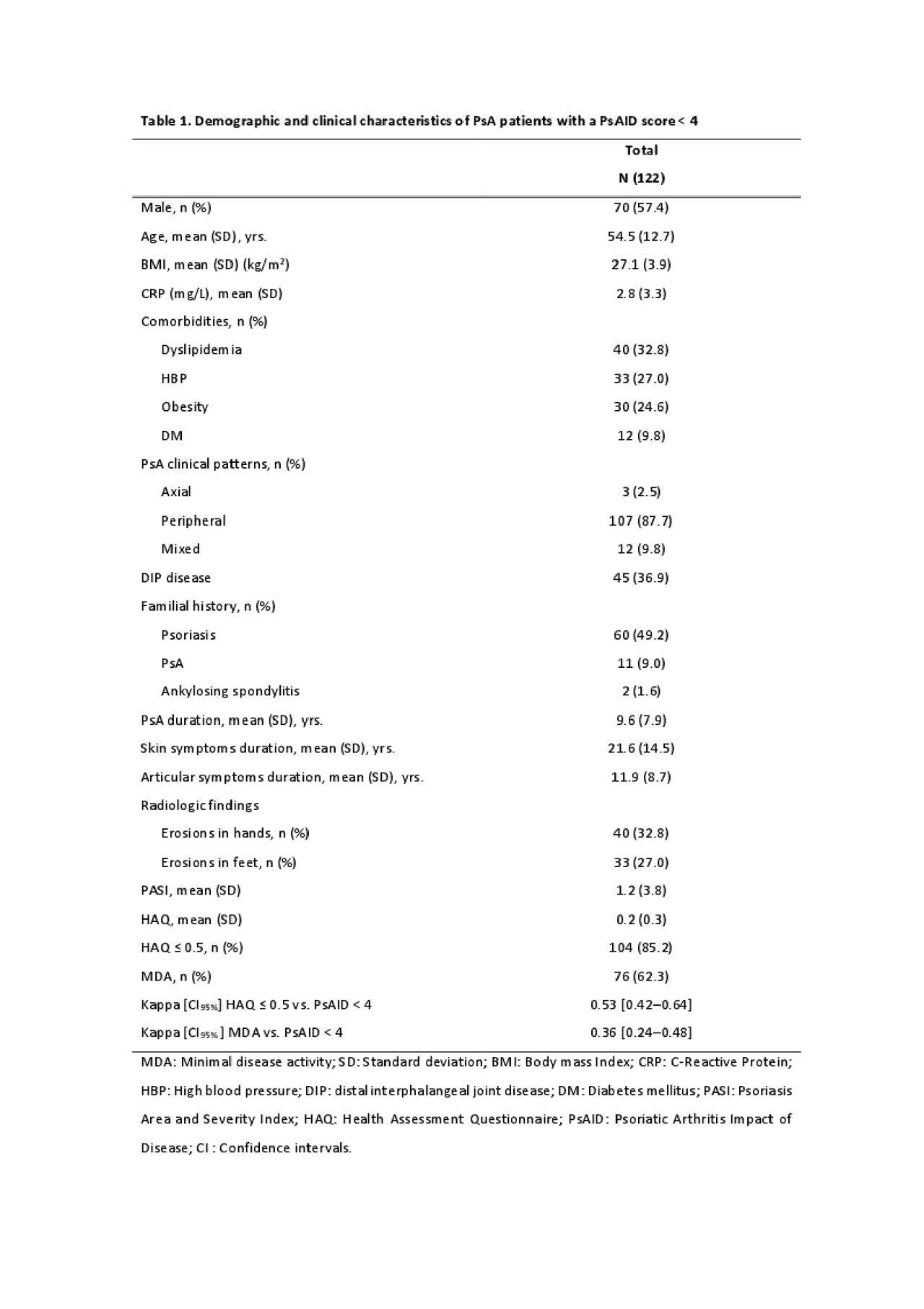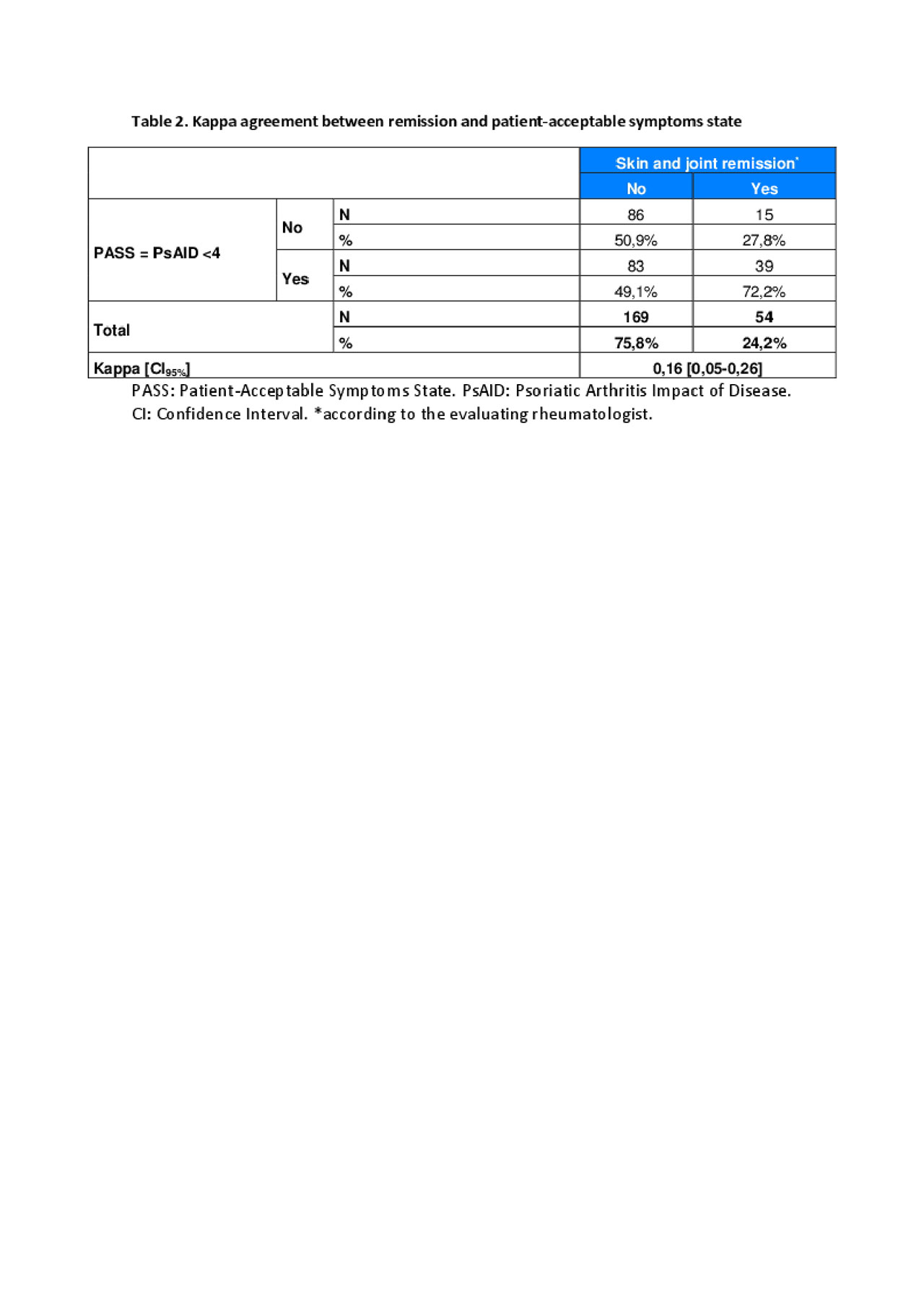Session Information
Date: Sunday, November 10, 2019
Title: Patient Outcomes, Preferences, & Attitudes Poster I: Patient Reported Outcomes
Session Type: Poster Session (Sunday)
Session Time: 9:00AM-11:00AM
Background/Purpose: Both the evaluation of disease activity in psoriatic arthritis (PsA) and the determination of the impact of the disease on patients’ lives are subjects of intense research at present. Our objective was to evaluate the concordance between the state of clinical remission and an acceptable symptomatic state for patients.
Methods: Post hoc analysis of a multicentre study that included 223 patients with PsA treated with biologic and non-biologic drugs. Remission was defined according to the evaluating physicians and DAPSA definitions. DAPSA score was calculated by adding the number of tender and swollen joints, VAS pain, patient-reported global assessement (PtGA), and CRP (mg/dl). The cDAPSA was calculated without the contribution of CRP. DAPSA and cDAPSA score ≤ 4 identified clinical remissions.
A descriptive statistical analysis of all the variables was performed, including central tendency and dispersion measures for continuous variables, and absolute and relative frequencies for categorical variables. Student’s t-test, Mann-Whitney-U test or Kruskall Wallis H test were used to compare quantitative variables and Pearson’s chi-square or Fisher’s exact tests for qualitative variables. Concordance was assessed using Cohen’s κappa (k) and was considered as follows: < 0.20 = poor, 0.21–0.40 = fair, 0.41–0.60 = moderate, 0.61–0.80 = good, and 0.81–1.00 = very good. Tests were two-tailed with a significance level of 5%. Data were analysed using SPSS V19.0 statistical software.
The PsAID questionnaire reflects the impact of PsA from the patients’ perspective. It is comprised of 12 physical and psychological domains. Each domain is rated from 0 to 10 with a different weighting. Total score is divided by 20. The final score has a range from 0 (best status) to 10 (worst status) with a cutoff of 4. A PsAID value below 4 defines a PASS state.
Results: Of the 223 patients analysed, 122 (54.7%) met the PsAID criterion below 4. The characteristics of this subpopulation are shown in Table 1. There was fair (k: 0.23) and poor (k: 0.17) agreement between joint and cutaneous remission respectively (according to the evaluating physician) and PASS status. the degree of agreement between a complete clinical remission (both cutaneous and articular according to the evaluating physician) and the PASS status was low (k: 0.16, Table 2). There was a moderate agreement (k: 0.46) between DAPSA remission and PASS, while there was almost a good concordance (k: 0.58) between cDAPSA remission and PASS.
Conclusion: The agreement between the state of remission judged by doctors and PASS is quite low. The degree of agreement between DAPSA remission and PASS is better, but it is still moderate. Both DAPSA and PsAID should be included in the routine clinical assessment of patients with PsA, since both offer a superior overall view to that given by each instrument separately. It is also better to define remission in accordance to a composite index rather than according to physicians´ opinion.
To cite this abstract in AMA style:
Queiro R, Pardo E, Charca L, Alonso S, Arboleya L, Alperi-López M. Poor Concordance Between Remission Judged by Physicians and a Patient-Acceptable Symptom State in Psoriatic Arthritis [abstract]. Arthritis Rheumatol. 2019; 71 (suppl 10). https://acrabstracts.org/abstract/poor-concordance-between-remission-judged-by-physicians-and-a-patient-acceptable-symptom-state-in-psoriatic-arthritis/. Accessed .« Back to 2019 ACR/ARP Annual Meeting
ACR Meeting Abstracts - https://acrabstracts.org/abstract/poor-concordance-between-remission-judged-by-physicians-and-a-patient-acceptable-symptom-state-in-psoriatic-arthritis/


